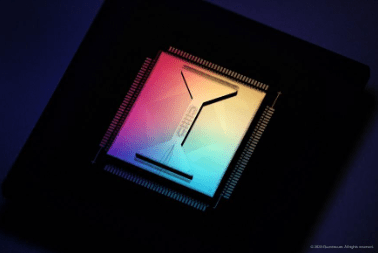
By Dan O’Shea posted 05 Jun 2024
Quantinuum announced its H2-1 quantum computer, a trapped-ion, 56-qubit machine whose unveiling comes a little over one year after the debut of the 32-qubit System Model H2.
The company also is claiming that “a new world record” for the cross entropy benchmark on the H2-1 was set by a joint team from Quantinuum and JPMorgan Chase, the finance giant that has been deeply involved in quantum research for years and back in January invested in Quantinuum. The joint team from Quantinuum and JPMorgan Chase ran a Random Circuit Sampling (RCS) algorithm, achieving what the companies claim was a 100x improvement over prior industry results from Google in 2019.
Quantinuum CEO Rajeeb Hazra said, “Our focus on qubit quality – trapped ion qubits that solve complex problems with higher fidelity and greater accuracy – versus the quantity of qubits is changing what’s possible, and bringing us closer to the long-awaited commercialization of quantum’s applications across industries like finance, logistics, transportation and chemistry.”
“The fidelity achieved in our random circuit sampling experiment shows unprecedented system-level performance of the Quantinuum quantum computer,” said Marco Pistoia, Head of Global Technology Applied Research at JPMorgan Chase, and a frequent speaker at IQT events, including the IQT Quantum+AI event this October. “We are excited to leverage this high fidelity to advance the field of quantum algorithms for industrial use cases broadly, and financial use cases in particular.”
Quantinuum’s analysis also indicates that the H2-1 executes RCS with an estimated 30,000x reduction in power consumption compared to classical supercomputers, reinforcing it as the preferred solution for a wide array of computational challenges.
News of the achievement with the RCS algorithm comes just days after Quantinuum and JPMorgan Chase, together with Argonne National Laboratory, claimed a theoretical quantum speed-up with the Quantum Approximate Optimization Algorithm.
Microsoft and Quantunuum also recently said the H2-1 was the first quantum computer capable of achieving Level 2 Resilient quantum computing, creating four reliable logical qubits using error correction and detection to achieve an 800-fold reduction in error rate.
“Microsoft is proud of our collaboration with Quantinuum, especially as the team premieres their trapped-ion 56-qubit machine,” said Dennis Tom, General Manager Microsoft Azure Quantum. “With the additional physical qubits available on Quantinuum’s new machine, we anticipate creating more logical qubits with even lower error rates. As we reach these milestones, we will continue to increase the resiliency of quantum operations as well as the utility of quantum computing.”
Image: Quantinuum H2-1 ion trap (Quantinuum)
Dan O’Shea has covered telecommunications and related topics including semiconductors, sensors, retail systems, digital payments and quantum computing/technology for over 25 years.
- SEO Powered Content & PR Distribution. Get Amplified Today.
- PlatoData.Network Vertical Generative Ai. Empower Yourself. Access Here.
- PlatoAiStream. Web3 Intelligence. Knowledge Amplified. Access Here.
- PlatoESG. Carbon, CleanTech, Energy, Environment, Solar, Waste Management. Access Here.
- PlatoHealth. Biotech and Clinical Trials Intelligence. Access Here.
- Source: https://www.insidequantumtechnology.com/news-archive/quantinuum-debuts-56-qubit-h2-1-touts-rcs-achievement-with-jpmorgan-chase/
- :has
- :is
- 05
- 100x
- 12
- 16
- 19
- 2019
- 2024
- 24
- 25
- 29
- 30
- 378
- 41
- 7
- 8
- 9
- a
- accuracy
- Achieve
- achieved
- achievement
- achieving
- across
- Additional
- advance
- After
- algorithm
- algorithms
- All
- also
- alt
- an
- analysis
- and
- announced
- anticipate
- applications
- applied
- approximate
- ARE
- Argonne National Laboratory
- Array
- AS
- At
- available
- Azure
- been
- Benchmark
- Bringing
- broadly
- button
- by
- capable
- cases
- categories
- ceo
- challenges
- changing
- chase
- chemistry
- claim
- claimed
- claiming
- closer
- collaboration
- comes
- commercialization
- Companies
- company
- compared
- complex
- computational
- computer
- computing
- consumption
- continue
- covered
- Creating
- Cross
- Days
- debut
- Debuts
- deeply
- Detection
- digital
- Digital Payments
- error
- especially
- estimated
- Even
- Event
- events
- excited
- Executes
- experiment
- false
- fidelity
- field
- finance
- financial
- First
- Focus
- For
- four
- frequent
- from
- General
- giant
- Global
- greater
- head
- High
- higher
- HTTPS
- image
- improvement
- in
- Including
- Increase
- indicates
- industrial
- industries
- industry
- inside
- Inside Quantum Technology
- invested
- involved
- IT
- ITS
- January
- joint
- JPMorgan
- jpmorgan chase
- just
- laboratory
- Leverage
- like
- little
- logical
- logistics
- long-awaited
- lower
- machine
- manager
- Marco
- max-width
- Microsoft
- Microsoft Azure
- Milestones
- model
- more
- National
- Nature
- New
- october
- of
- on
- ONE
- Operations
- optimization
- our
- over
- particular
- payments
- performance
- physical
- plato
- Plato Data Intelligence
- PlatoData
- possible
- posted
- power
- preferred
- problems
- proud
- quality
- Quantinuum
- quantity
- Quantum
- quantum algorithms
- Quantum Computer
- quantum computing
- quantum research
- quantum technology
- Qubit
- qubits
- random
- Rate
- Rates
- reach
- recently
- reduction
- reinforcing
- related
- reliable
- research
- resiliency
- resilient
- retail
- ROW
- Said
- Semiconductors
- sensors
- set
- Shows
- solution
- SOLVE
- Speaker
- system
- Systems
- team
- Technology
- telecommunications
- that
- The
- the joint
- their
- theoretical
- These
- this
- to
- together
- tom
- Topics
- transportation
- trapped
- true
- unprecedented
- unveiling
- us
- use
- using
- utility
- Versus
- was
- we
- WELL
- What
- whose
- wide
- will
- with
- world
- year
- years
- zephyrnet













